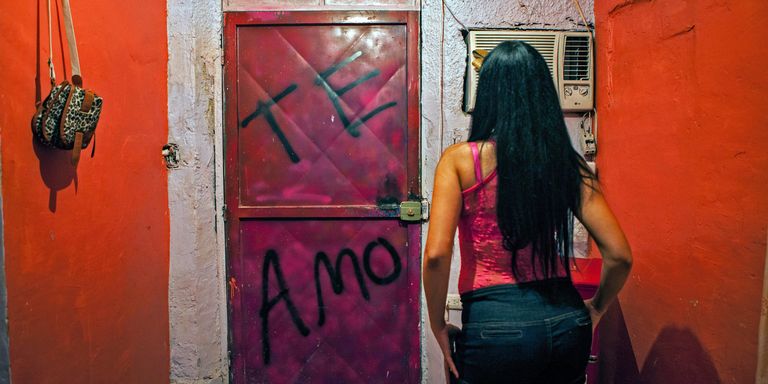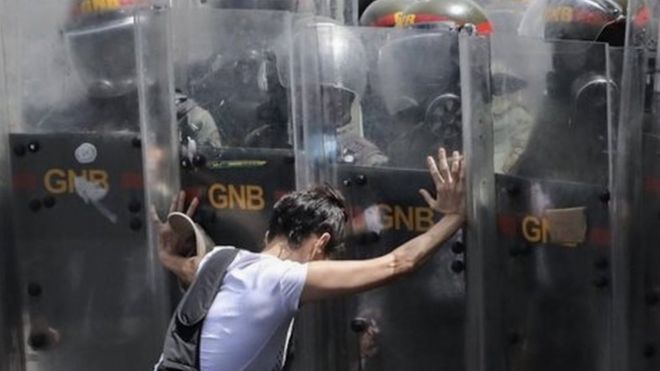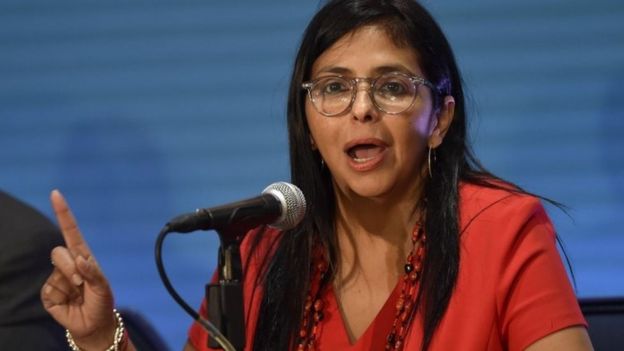- Joined
- Feb 23, 2014
- Messages
- 57,516
- Reaction score
- 25,167
Socialism isn't anything to be afraid of, unless you fear hunger, economic decay, and authoritarian violence against the populace.*Insert fear mongering propaganda here*
Socialism isn't anything to be afraid of, unless you fear hunger, economic decay, and authoritarian violence against the populace.*Insert fear mongering propaganda here*
im told venezuelan girls are premium
sounds like waifus are available at a discount, how do i give them a green card marriage without getting robbed and murdered?
It's an really intresting case study into the masses to see how people react to harsh conditions like in Mexico and the Middle east (and elsewhere)with vicious violence all over and terrible poverty they just usually accept it and don't or can't overthrow their corrupt systems
It's an really intresting case study into the masses to see how people react to harsh conditions like in Mexico and the Middle east (and elsewhere)with vicious violence all over and terrible poverty they just usually accept it and don't or can't overthrow their corrupt systems
Socialism isn't anything to be afraid of, unless you fear hunger, economic decay, and authoritarian violence against the populace.
Venezuela crisis forces women to sell sex in Colombia, fuels slavery risk
June 05, 2017

As a humanitarian and political crisis in neighboring Venezuela deepens, a growing number of Venezuelan women are working in bars and brothels across Colombia.
"I didn't do this in Venezuela. I never ever imagined I'd be doing this in Colombia," said Maria, who declined to give her real name, to Reuters.
She charges $17 for 15-minutes of sex, and the money earned is spent on buying medicine for her mother who has cancer.
For the past year, she has traveled back and forth from Bogota to Venezuela's capital Caracas every 90 days, before her tourist visa expires, carrying medicine, food and soap.
"I'm ashamed I have to do this. It's a secret," said Maria, 26, who has told her family she is a traveling salesperson.
Venezuelan migrants are often lured by false promises of well-paid work in Colombia's restaurants and bars or as domestic workers.
But then they find they are forced to work long hours with little or no pay, are not free to leave the bar they work in, and may be trapped by debts owed to the agents who brought them across the border.
According to Asmubuli, a Colombian sex workers association, currently there are around 4,500 Venezuelan sex workers in the country.
Fidelia Suarez, head of the sex workers association, cited the case of 11 Venezuelan women trapped in a dingy bar in Colombia's northern city of Bucaramanga. At first, she said, the women were allowed to come and go as they pleased, but in February the bar owner seized their documents, withheld their wages, and prevented them from leaving the bar.
"That's slavery," said Suarez, who has visited the bar. "They are enslaved there, under the conditions and rules decided by the owner, which aren't legal."
Tens of thousands of Venezuelans have crossed into Colombia in the past year, as triple-digit inflation, a collapsed health system and weeks of violent protests engulfs oil-rich Venezuela.
As prostitution is legal in Colombia it makes it difficult for society to see sex workers as victims of trafficking, and a blurry line often exists between those who voluntarily engage in adult prostitution and those coerced into sex work.
It's not just women who say they have no option but to sell their bodies for sex, but young Venezuelan men too.
Dorian, 25, started working in Bogota’s Lourdes Park about two weeks ago.
"It's disappointing. I'm disappointed in myself," said Dorian, a business studies university graduate unable to find a job and with no money to pay for rent and food.
He left Venezuela six months ago, after a close friend was shot dead by gang members on his way home from a party.
"It could have been me. I knew then that I had to flee, that I was in danger," said Dorian, dressed in tight white trousers.
"The economic instability, the insecurity in Venezuela, it all becomes unbearable."
http://www.foxnews.com/world/2017/0...-sell-sex-in-colombia-fuels-slavery-risk.html




Russia has slashed projected revenue by nearly $1 billion to reflect expectations that Venezuela may not make timely payments on bilateral loans, according to a document released by Russia's Audit Chamber on Tuesday.
The OPEC member over the years borrowed heavily from political allies including Russia and China, but is now struggling to pay back creditors including bondholders on Wall Street as its socialist economy collapses.
The issue is likely to draw attention in Washington, where lawmakers have questioned Venezuelan state oil firm PDVSA's [PDVSA.UL] use of a portion of its shares in U.S. subsidiary Citgo as collateral for a loan from Russia because this could leave Moscow with indirect control over U.S. energy infrastructure.
Russia's Audit Chamber, in a revision to the Russian state budgets for 2017-19, said Venezuela had not fulfilled its obligations under the Russia-Venezuela intergovernmental protocol from September 2016. That agreement was an amendment to a Russian loan granted in December 2011.
The Audit Chamber is responsible for checking domestic state spending, and has published its review on the proposed changes to the state budget for 2017 and further into 2018-19.
Venezuela owed Russia $2.84 billion as of September of that year, including missed payments on the debt and interest, according to the 2016 protocol, which was published separately earlier.
Details of the loans and the consequences for not paying them on time were not immediately evident.
Venezuela's Oil Ministry and PDVSA did not immediately respond to a request for comment.
Russia's oil major Rosneft has lent its Venezuelan counterpart PDVSA between $4 billion and $5 billion in recent years, according to Reuters calculations. The firm has been gaining ground in Venezuela as the cash-strapped leftist government scrambles for cash.
In its most recent quarterly financial statement, Rosneft confirmed having provided $1.49 billion to PDVSA in 2016, secured by oil supply contracts. Rosneft's CEO, Igor Sechin, in May confirmed that the company received Citgo collateral.
PDVSA has also fallen months behind on shipments of crude and fuels under oil-for-loan deals with Russia, as well as China, according to internal company documents seen by Reuters.
Rosneft will get 70,000 barrels per day of Venezuelan oil this year under the most recent loan deal, Venezuela's oil minister Nelson Martinez said earlier this month, without providing further details on the type or time frame of the loan.

Venezuela defaulted on part of its $2.5 billion loan from Russia's state-controlled oil company Rosneft once again, giving Wall Street bond lords cause for concern that a default on PDVSA oil bonds is right around the corner. PDVSA is a quasi-sovereign and is the government's only remaining cash cow. The government owed Rosneft a reported $950 million.
News of the missed payment sent Venezuela’s $3 billion government bond due 2022 to trade at around 57 cents, for an annualized yield of 29.3% for those lucky (or unlucky) enough to be buyers at those levels. Assuming the par value of the bond was $100, that means the bond is now worth $57. Some bondholders in London immediately questioned whether or not the missed Russia payment constituted a default, the Financial Times reported. The International Swaps and Derivatives Association said it did not.
Investors have been waiting for an official default for nearly a year now. Venezuela keeps pulling a rabbit out of its hat. Last month, Goldman Sachs "loaned" the government $2.8 billion by buying distressed PDVSA bonds. The purchase sent the anti-PSUV crowd into the streets of New York, calling into question the beating, bleeding heart of the famous American "vampire squid." In its original statement, Goldman said: "We recognize that the situation is complex and evolving and that Venezuela is in crisis. We agree that life there has to get better, and we made the investment in part because we believe it will."
But it has not. Venezuela is getting worse. And paying bondholders may prove to be highly unpopular for the United Socialists of Venezuela (PSUV), a party whose soul rests on an anticolonial narrative spun by the late Hugo Chavez. Chavez made going against Washington free traders and capitalist pigs his calling card. It is hard to imagine a PSUV-controlled government siding with Wall Street over poor people, but so far, that has been the case. This is a ticking time bomb waiting to explode.
Cash flow concerns continue. To make matters worse, a Deleware court granted Canadian miner Crystallex International a $1.4 billion arbitral award against the Venezuelan government on June 12. The Venezuelan government was found attempting to evade payment to Crystallex by moving its assets out of the U.S. and into Delaware subsidiaries of a state-owned company. These recurrent themes of missed payments and late payments and now the Cyrstallex arbitration ruling all add to cash flow stress. Holders of PDVSA bonds will have to tend with falling bond prices and hope their hefty interest payments are not wiped out by capital losses in a hard default.
Venezuela's political crisis has yet to lead to regime change. Nicolas Maduro is still in power following two months of daily protests calling for his ouster. PSUV is holding on tight like a tick on a dog.
For Goldman Sachs' PDVSA bonds, the more important near-term outlook relates to oil. If oil prices don't fall too much, PDVSA can keep the lights on.
"We cannot predict the exact timing of either regime change or a hard default," says Siobhan Morden, a managing director for Nomura Securities in New York. She is still holding out for a "muddling through" and no default in order to avoid a backlash of further economic stress. A default means companies like Rosneft and Goldman Sachs stop funding Venezuela. Then the country essentially goes bankrupt.
The biggest risk is if PSUV supporters manage to convince the government that it should use the money to support the poor instead of making interest payments. So far, disdain for PSUV is so great that even Maduro and die-hard Chavistas have not been able to get that message across successfully. The World Bank recently forecast Venezuela's GDP to contract this year and in 2018.
Goldman Sachs may walk away from this with a huge payday, and the Russians may yet get paid. Nomura's in-house cash flow analysis shows a neutral position this year with even higher conviction if oil remains stable.
Venezuela has an estimated $243 million in bond payments due later this month and another $70 million in July. There's not much cushion for liabilities like the Russian loan and the Crystallex award, both now a serious overhang.
"Venezuela continues to pursue delay tactics on appealing these judgments to avoid a technical default," Morden says about Crystallex in particular.
Despite the anti-Yankee world view from Chavez and his ilk, Venezuela's government seems less fond of the Russians and the Chinese. Even the Canadians. It is the Americans bond fund manager getting paid first.
In February, PDVSA fell months behind on shipments of crude and fuel under an oil-for-loan deal with both China and Russia, according to internal company documents reviewed by Reuters. Russia and China have loaned some $55 billion to the country over the last three years, with most of it coming from China. So far, U.S. investors have only been impacted by rumors of missed payments crushing PDVSA bond prices, rather than an actual PDVSA bond default. Goldman Sachs Asset Management purchase PDVSA bonds for 31 cents on the dollar, a flea market sale of nearly 70% from par value and with super-high yield in dollars. It was a gamble that Venezuela eventually gets its act together. Unless PSUV cancels democratic elections, this party might not last another two years. The general election is scheduled for October 2018.


You know you've done goofed when China doesn't want to loan you money. Maduro thinks he can just seize the factories and start producing shit. Somebody please teach him some basic economics.
Venezuelan Minister Sneers at U.S. Diplomat: ‘Send In Your Marines’
By Patrick Goodenough | June 21, 2017
Venezuela’s fiery foreign minister clashed with a senior U.S. diplomat at an Organization of American States meeting Tuesday, saying mockingly that the only way a regional mediation initiative responding to the crisis in her country could be imposed on Venezuela would be to “send in your Marines.”
Foreign Minister Delcy Rodriguez did not take kindly to a proposal by Mexico’s foreign minister that the OAS set up a regional “contact group” in response to the political and economic crisis in the socialist-ruled country.
U.S. Deputy Secretary of State John Sullivan urged the OAS meeting in Cancun to “take a modest step to put together a group that would help facilitate a resolution of the serious problems which we all acknowledge are present in Venezuela.”
If the 34-member regional grouping could not agree on that at the very least, he said, “we seriously impair our ability to go forward as an organization.”
Moments later Rodriguez hit back at Sullivan, calling the contact group proposal useless and unnecessary.
“The only way you could impose it would be to send in your Marines – who would meet with a crushing response from Venezuela if they dared make such a misstep,” she jeered.
Earlier, Rodriguez suggested U.S. wanted to intervene in her country in order to exploit its oil reserves.
Sullivan dismissed the arguments she put forward as “distractions, distortions, and irrelevancies.”
“The facts on the ground in Venezuela are apparent to all of us,” he said. “This is a moment of challenge for this organization to prove its relevancy.”
On Monday, the OAS failed to pass a resolution condemning President Nicolas Maduro’s controversial plan to convene a constituent assembly late next month to rewrite Venezuela’s constitution, thus bypassing the opposition-controlled National Assembly.
The motion received 20 votes, three short of the two-thirds majority required.
At least 70 people have been killed since April during protests against Maduro’s actions, including attempts to strip the National Assembly of its power to make laws. An accompanying economic crisis is reflected in sky-high inflation and severe shortages of food, medicines and other items.
The meeting in Cancun, which runs through Wednesday, has seen a walkout and several outbursts from Rodriguez, who derided Venezuela’s Latin American critics, calling them “lapdogs of imperialism” and – in the case of her Costa Rican counterpart Manuel González Sanz – a “political illiterate who knows nothing about Venezuela.”
González’ criticism appeared to irk the Venezuelan representative in particular. He had urged the OAS to condemn the Maduro regime for “violent acts, the economic and political crisis, the shortages of food and medicines, and the violation of rights and freedoms.”
In her response to González, Rodriguez also took another swipe at the United States.
“You should address the main country that causes inequality and hunger – not only in this region but in the whole world, of violence, death, and all the problems you have,” she told the Costa Rican. “But that is never going to happen because you are reading from a script …”
On Monday, U.S. Deputy Assistant Secretary Michael Fitzpatrick at a press briefing in Cancun warned that Maduro’s government would be accountable for the consequences if it goes ahead with the deeply-unpopular plan to rewrite the constitution.
“Should the Maduro regime decide to ignore the national and international outrage and appeals, and instead proceed to do away with the constitution in a patently illegal and dangerous manner in the context of an already polarized society,” he said, “the regime will bear a special responsibility for whatever befalls Venezuela thereafter.”
http://www.cnsnews.com/news/article...minister-sneers-us-diplomat-send-your-marines
Mattis... remove all the hot women and then turn Venezuela to glass.. make the green grass grow.
Venezuelan women are hot the Corps would have no qualms about the deployment
